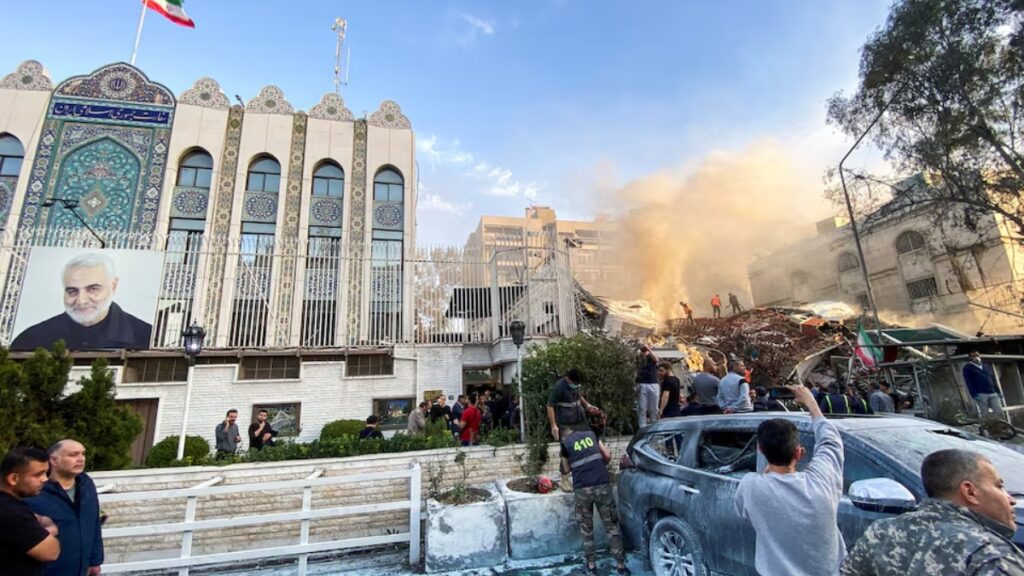
- Possible Iranian retaliation may include equivalent attacks, such as targeting Israeli embassies in third countries.
- Iran may opt to target Israeli territory directly, prompting Israel to issue an emergency response and prepare its military for potential threats from Iran.
- Given the ongoing conflict in Gaza and the escalating tensions between Israel and Iran, prospects for peace and stability in the region seem bleak.
Last week, Israel led an attack on the Iranian consulate in Syria, which resulted in the deaths of seven individuals, including senior IRGC officers from Iran. According to the Israeli strike, they aimed to target terrorist individuals affiliated with the IRGC. In this incident, the senior IRGC commander Zahidi was found among the casualties. It is important to note that Iran and Israel share a long-standing conflict and differences, which have been further exacerbated since the Hamas-led terrorist attack on October 7th. These attacks have been met with retaliation from Israeli forces.
While the current conflict is primarily between Hamas and Israelis, the connection between Hamas and Iran is undeniable. Much of the support for Hamas comes from Iran. In the West Asia region, Iran and Israel face particular challenges due to Iran’s support for the Palestinian cause. Iran believes the land belongs to the Palestinian people, while Israelis see it as their territory with Iran interfering. Both countries view each other as security threats.
Various IRGC officers, including the Iranian Defense Minister and other senior Iranian ministers, have extensively discussed the response in the aftermath of the recent events. They have all expressed the need to retaliate against Israeli actions, as articulated by Ayatollah Khamenei, the Supreme Leader of Iran. He has vowed retaliation to maintain deterrence, especially considering recent attacks targeting IRGC officers in regions like Sistan and Baluchistan, which borders Pakistan. In these regions, terrorist groups like the Baluchistan Liberation Forces have been infiltrating Iran, deliberately targeting IRGC officers.
The heightened security threat has prompted Iran to send a strong signal of deterrence. Possible Iranian retaliation may include equivalent attacks, such as targeting Israeli embassies in third countries. Interestingly, Israel has temporarily closed 28 of its embassies worldwide in response. Another option for Iran is to leverage its extensive proxy groups, such as Hezbollah in Lebanon, Hamas in Gaza, Shiite forces in Iran and Iraq, and Houthi rebels in Yemen, to launch retaliatory strikes. Additionally, Iran may opt to target Israeli territory directly, prompting Israel to issue an emergency response and prepare its military for potential threats from Iran.
It is essential to understand that this region is a battleground for the strategic presence of both Iran and Israel. Iran has also felt isolated due to the diplomatic shifts in the region, including the Abraham Accords brokered under the presidency of Donald Trump, which saw countries like the United Arab Emirates and Bahrain normalising relations with Israel.
These developments have been a setback for Iranian diplomacy, which sought solidarity based on Muslim values and brotherhood. However, support from Muslim-majority countries like the United Arab Emirates and Bahrain to Israel undermined Iran’s efforts. Despite diplomatic attempts to reconcile with Saudi Arabia, the October 7th attack has hindered progress. Given the ongoing conflict in Gaza and the escalating tensions between Israel and Iran, prospects for peace and stability in the region seem bleak, with the likelihood of further instability and the potential for a regional war continuing to loom large.
(Srijan Kumar is pursuing a PhD in South Asian studies from Delhi University. He is a writer and a columnist for various digital media houses. Opinions expressed are the author’s own)
